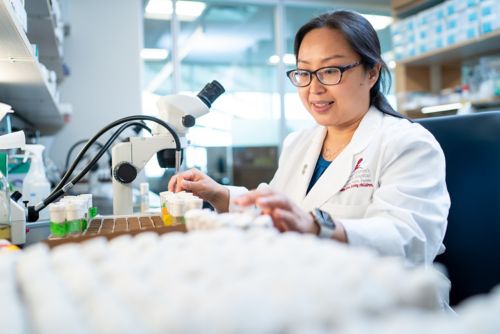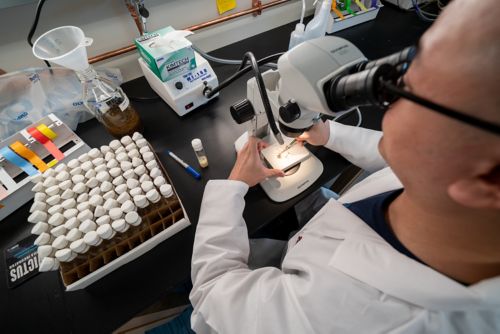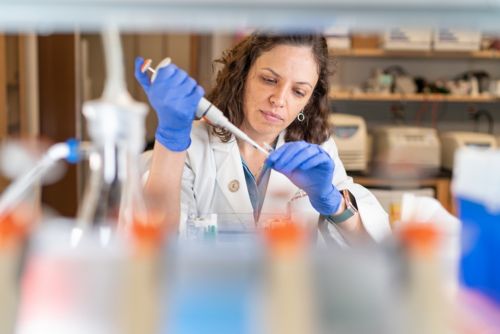St. Jude Family of Websites
Explore our cutting edge research, world-class patient care, career opportunities and more.
St. Jude Children's Research Hospital Home

- Fundraising
St. Jude Family of Websites
Explore our cutting edge research, world-class patient care, career opportunities and more.
St. Jude Children's Research Hospital Home

- Fundraising
Fabio Demontis Lab
Dissecting the role of proteostasis and muscle-to-brain signaling in aging and age-related diseases
About the Demontis Lab
Aging is the major risk factor for many human diseases. The goal of our research is to study fundamental cellular and molecular mechanisms of aging to promote healthspan and combat age-related diseases. Our lab focuses on the role of protein quality control (proteostasis) and how aging deranges this process in skeletal muscle and the central nervous system. In addition to cell-autonomous mechanisms of proteostasis, we work to understand how inter-organ communication between the skeletal muscle and the central nervous sytem (brain and retina) influences proteostasis and cognitive function as we age.

Our research summary
Aging is the major risk factor for many diseases, but the underlying mechanisms are not completely understood. As we age, our bodies undergo adaptive and maladaptive (degenerative) changes that impact organ and cellular functions. A key reason for the age-associated decline in organ and tissue function is the loss of protein quality control (proteostasis), which reduces the capacity of the cell to remove faulty proteins and organelles and ensure their normal turnover. This loss of protein quality control is a drivery of normal tissue and organ aging but also a cause of many age-related diseases, such as neurodegeneration.
Our laboratory explores novel areas of protein quality control and how they impact skeletal muscles and the central nervous system (CNS) during aging and disease. We also examine muscle-to-brain signaling to discover how healthy muscles can help preserve brain function and proteostasis during aging and, conversely, how deleterious signals released by unhealthy muscles can accelerate brain aging. Our goal is to dissect the fundamental mechanisms of proteostasis and muscle-to-brain signaling so we can understand how to preserve and extend a healthy lifespan in humans.
Protein quality control in the skeletal muscle and CNS during aging
The progressive decline in skeletal muscle mass and function that occurs with aging (sarcopenia) is a deleterious condition that reduces survival and increases the risk of age-related disease in non-muscle tissues. Our work determined that the decline in proteostasis is a cause of age-related skeletal muscle dysfunction and that sarcopenia can be impeded by preserving protein quality control via proteases and the ubiquitin/proteasome and authophagy/lysosome systems.
Our research seeks to understand fundamental new mechanisms of protein quality control in the skeletal muscle and central nervous system and their role in aging and age-related diseases.

Influence of muscle-secreted signals on brain proteostasis and function during aging
Systemic homeostasis relies on inter-organ crosstalk, with such inter-tissue communication becoming deranged during aging. Epidemiological surveys and studies in model organisms indicate that signals released by healthy muscles can protect the CNS from the effects of aging and, conversely, muscle dysfunction is deleterious for brain and systemic aging. Our laboratory examines this connection between the skeletal muscle and the CNS. In particular, we study muscle-secreted signaling factors (myokines and myometabolites) that signal to the brain and retina. Skeletal muscle can release such signaling factors in response to exercise and related processes, such as the unfolded protein stress response, nutrient sensing, and pro-longevity pathways.
Our work strives to identify key muscle-secreted factors that protect the CNS from the age-related loss of proteostasis. Additionally, we want to understand how myokines regulate normal brain function, such as in the initiation of feeding behavior and sleep.

Intersection of aging biology with human disease
We are broadly interested in aging and age-related processes and their impact on human disease. As an example, we work to identify interventions to boost muscle regeneration and understand how aging influences cancer-induced muscle and systemic wasting (cachexia). Research in this area may highlight vulnerabilities of pediatric versus adult cancers and provide interventions to preserve skeletal muscle mass and function in cancer patients and cancer survivors.
Publications
Contact us
Fabio Demontis, PhD
Associate Member
Department of Developmental Neurobiology
MS 322, Room M2421
St. Jude Children's Research Hospital

Memphis, TN, 38105-3678 USA GET DIRECTIONS